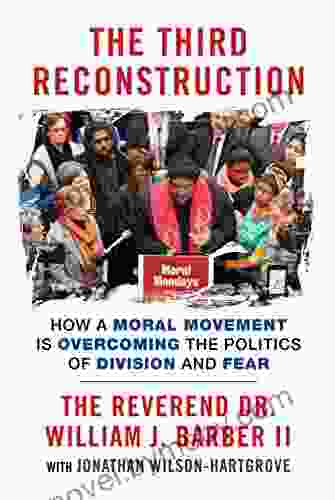In a world increasingly plagued by division and fear, a beacon of hope shines brightly: the power of moral movements. "How Moral Movement Is Overcoming The Politics Of Division And Fear," a thought-provoking and timely book, delves into the transformative role of moral movements in shaping our societies, fostering unity, and inspiring positive change.
The Genesis of Moral Movements
Moral movements emerge when individuals share a profound concern for human dignity, justice, and equality. Rooted in a collective sense of outrage and injustice, these movements mobilize people from all walks of life to advocate for a common cause. Throughout history, moral movements have played a pivotal role in shaping social and political landscapes, from the abolition of slavery to the civil rights movement.
4.8 out of 5
| Language | : | English |
| File size | : | 1421 KB |
| Text-to-Speech | : | Enabled |
| Enhanced typesetting | : | Enabled |
| X-Ray | : | Enabled |
| Word Wise | : | Enabled |
| Print length | : | 170 pages |
| Screen Reader | : | Supported |
The Defining Characteristics of Moral Movements
Moral movements are distinguished by their unique characteristics:
- Moral Purpose: They are driven by a deep-seated belief in the inherent rights and dignity of all individuals.
- Nonviolent Methods: Moral movements typically employ nonviolent strategies, such as protests, civil disobedience, and boycotts, to achieve their aims.
- Broad Support: They attract supporters from diverse backgrounds, united by a shared moral conviction.
li style="text-align: justify;">Long-Term Vision: Moral movements are not merely reactionary; they strive to create lasting social and political change.
The Role of Moral Movements in Overcoming Division
Division and fear can tear communities apart. However, moral movements serve as catalysts for unity and reconciliation. By highlighting common values and aspirations, these movements foster a sense of belonging and shared purpose. They create spaces for dialogue, bridge gaps between marginalized groups, and challenge the forces that perpetuate division.
The Political Impact of Moral Movements
Moral movements have a significant impact on the political landscape. They raise public awareness of important issues, put pressure on policymakers, and influence electoral outcomes. By engaging in political processes, moral movements push for laws and policies that align with their moral principles. This can lead to tangible changes in society, from improved civil rights to increased social justice.
The Future of Moral Movements
As the challenges of our world continue to evolve, the need for moral movements remains paramount. The future holds immense promise for these movements, as technology provides new avenues for mobilization and engagement. Social media platforms, for example, have empowered individuals to amplify their voices and connect with like-minded people worldwide.
Case Studies of Successful Moral Movements
The book presents insightful case studies of successful moral movements that have overcome adversity and achieved significant social change. From the anti-apartheid movement in South Africa to the women's suffrage movement in the United States, these inspiring accounts demonstrate the transformative power of collective action driven by moral purpose.
"How Moral Movement Is Overcoming The Politics Of Division And Fear" is a must-read for anyone who believes in the potential of human compassion and solidarity. It is a timely reminder that even in the darkest of times, moral movements can ignite hope, foster unity, and create a more just and equitable world. By embracing the principles of nonviolence, inclusivity, and long-term vision, we can harness the transformative power of moral movements to overcome the challenges that divide us and build a future worthy of all.


























































































